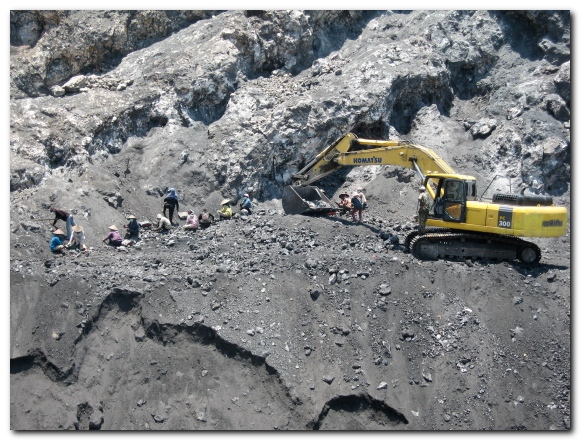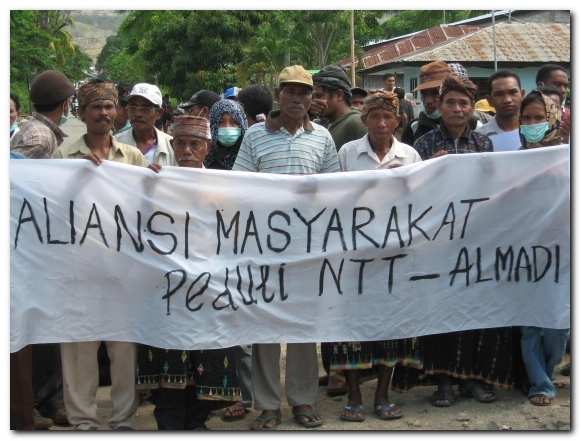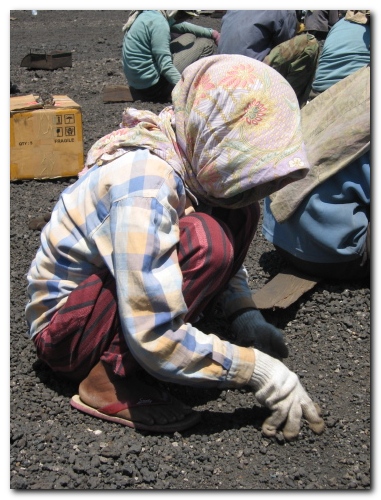Nicola Colbran
Working hard at the PT Sumber Jaya Asia manganese mineNicola Colbran |
East Nusa Tenggara, Indonesia’s south easternmost province, is famous for its unique flora and fauna and has one of the most diverse marine environments in the world. Yet this natural beauty has brought little wealth to the peoples of the province and it remains mostly under-developed. East Nusa Tenggara has one of Indonesia’s highest rates of poverty and is prone to drought. It has poor infrastructure and its people suffer from malnutrition and hunger, low levels of schooling and inadequate access to health care. Unemployment is high and the challenge for government is how to tackle these problems and develop a prosperous future for the peoples of the province.
One quick fix often put forward by officials and business interests is revenue from mining. East Nusa Tenggara has vast reserves of manganese, gold and marble and mining activities have increased exponentially in recent years. Each month district heads grant more mining licences but it is impossible to know exactly how many have been issued. In early October 2009, the Kupang Post reported that the district heads of Timor Tengah Selatan, Timor Tengah Utara and Belu had issued 133 mining exploration permits without the knowledge of the provincial governor. Further, the district government of Belu helped establish an association of 56 manganese producers, the ‘Association of Manganese Companies in Belu District,’ intended to assist the government in managing manganese mining activities and in developing the district. Decentralisation of government in 1999, which gave district governments and officials access to huge mining revenues, has facilitated a ‘no fuss’ granting of permits to the mining companies.
Noticeably absent from this decision making process is any meaningful community consultation or participation. According to Indonesia’s Constitution, exclusive management rights over land, water and natural resources are vested in the state and must be utilised for ‘the maximum welfare of the people’. But the governments of East Nusa Tenggara at both the district and provincial level appear to be deciding for themselves what is ‘the maximum welfare of the people’ without bothering to consult the people involved.
Mining for whom?
In Torong Besi, Manggarai district on the island of Flores, manganese mining was first permitted in 1997 when the Suharto-era central government granted a licence to PT Istindo Mitra Oerdana. In 2007, the district head approved the transfer and extension of the licence from a second company, PT Tribina Sempurna, to PT Sumber Jaya Asia.
PT Tribina Sempurna had made an agreement in 2005 with several local communities in exchange for land. As an example, one community from Wakung made an agreement with the company that it would give some of its customary land to the company. In return, the company would pay the community Rp.20,000,000 (A$2380), build a community house (10m x 9m), clean up land around Gerkua (a local area) plus build a road to Gerkua and build a chapel (20m x 10m). The community is still waiting for these commitments to eventuate.
These unfulfilled promises have caused much distrust in the local communities which has been further compounded by the social and environmental damage caused by the mine. PT Sumber Jaya Asia is apparently mining in a protected forest important to the welfare of the surrounding communities. The forest, Nggalak Rego, contains an important natural water source for these communities and is also a water catchment area. This water source and catchment area have been destroyed by the manganese mine. Local communities now suffer from water shortages and for the last three years their crops have failed. The forest also has important cultural significance as it is a sacred area where traditional ceremonies, such as rituals for rain, were performed. The communities can no longer access the area because of the mining. There is a gaping hole where once a mountain used to be and security officers now prevent public access to the mine site.
Mining activities have increased exponentially in recent years
At the mine site itself, the conditions endured by workers are of equal concern. Dozens of labourers work separating the manganese from waste rocks for nine hours a day. Maria, one of the workers, starts at 7am, has an hour break for lunch at midday, and finishes work at 5pm. She squats in the heat with no shade, gathering manganese by hand for processing and is paid Rp. 27,500 per day (A$3). She must provide her own lunch and her own transport which costs Rp.15,000 per day (A$1.70). Maria works 6 days a week and is not paid if she does not work. The only health and safety equipment the company supplies are disposable gloves and mask, which are replaced only twice a month.
Recognising the impact of the mine on the community and environment, the Manggarai district head suspended PT Sumber Jaya Asia’s mining licence in 2008. The company was accused of conducting open pit mining in the Nggalak Rego forest without permission from the Minister for Forestry. The district government directed the company to apply for permission to mine from the central government’s Department of Forestry in accordance with the 1999 Forestry Law (Law No.41/1999 on Forestry). PT Sumber Jaya Asia submitted an application, but it was rejected and in January 2009 the Department of Forestry informed the governor of East Nusa Tenggara that the company was committing a criminal act. PT Sumber Jaya Asia then challenged the suspension of the licence in court. In March 2009, the Kupang District Administrative Court ruled in favour of the company, in effect removing the forest’s protected status. The local government has appealed the decision but mining still continues in the forest. Meanwhile, an elderly local resident was recently arrested and accused of illegal logging in the forest for cutting and collecting wood for the local school.
Fighting eviction
The experiences of the local communities in Manggarai have served as a warning for the peoples of Lembata, another district east of Flores. Lembata is a beautiful island, rich in culture as well as areas of scenic interest on land and at sea. It has vast natural resources, and its gold reserves are thought to be the third largest in the world.
 |
Workers dwarfed by environmental devastation at the manganese mineNicola Colbran |
Three mining companies have conducted mineral exploration there in the past, as a result contaminating water sources and leaving gaping holes in the landscape. Nevertheless, Lembata’s district government has permitted a new company, PT Merukh Lembata Copper, to carry out exploration activities, with exploitation scheduled to commence in 2011. The company holds mineral exploration rights for at least one third of Lembata. If the project goes ahead as planned it will result in the forced eviction and relocation of at least 60,000 people to another island, most likely Flores. This will sever the peoples’ ties with their ancestral lands and create the potential for extended conflict if they are resettled on land belonging to other peoples. It will also threaten food security and expose the peoples of Lembata to poverty and unemployment as their livelihoods are dependent on agriculture and supported by animal husbandry and fishing.
The decision to develop mining in Lembata was made unilaterally and. Lembata’s district head issued the permit to PT Merukh Lembata Copper with no public consultation or prior notice. By chance the local community discovered the written agreement between the two, provoking local outrage. After community protests escalated, district officials conducted ‘socialisation’ sessions presenting only the positive aspects of the gold mine. Several local community members recounted how officials treated them as if they were ignorant, telling them that the tailings from the gold mine could be purified to become drinking water and the mud could be turned into a golf course. Local people also reported that the Lembata district head and others attempted to gain community agreement to the mine through manipulation and intimidation, as well as by offering bribes to community leaders and other important figures. One prominent leader, active in opposing mining activities, was even placed under house arrest in Lewoleba, the capital of Lembata, charged with defaming the deputy district head in mid 2009.
Opposition from local communities
After three years of continuous protest, local communities remain opposed to the mine, even though active opposition takes them away from their livelihoods and causes constant distress and disruption. Their commitment is all the more remarkable given the poor roads and lack of transportation and communication facilities on Lembata. Local communities rally to the slogan ‘tolak tambang, harga mati’ (oppose the mine, no compromise). They reason that they do not need mining because there are many other industries that can be developed like aquaculture, agriculture and animal husbandry.
Community representatives have sent letters of protest, conducted mass public demonstrations, as well as ritual ceremonies and customary oaths to resist the mine. In March 2009, more than 2000 people blocked Lembata’s main road in protest, stopping police as well as staff of PT Merukh Lembata Copper and its environmental analysis team who had arrived to carry out another ‘socialisation’ meeting. Discovering that the road was blocked, district officials instead took PT Merukh staff by boat to Kedang, on Lembata’s coast. A number of protesters rushed to Kedang to stop the meeting, and demanded that PT Merukh staff sign a statement that the company would not mine in Kedang.
 |
Protesters outside the offices of PT Sumber Jaya AsiaNicola Colbran |
In recent months, it appears that Lembata’s district parliament has begun to listen. In April 2009 local elections were held and new members elected to the parliament. The new parliamentarians promised to respect the basic rights and improve the prosperity of the people of Lembata. To date they have been true to their word. In February 2010, the parliament called a halt to all mining activities on Lembata and promised to review government budgeting to ensure more a more effective and efficient allocation of funding. If only for the moment, the people of Lembata can breathe more easily.
But for other communities in East Nusa Tenggara the future is not so certain. The majority of people oppose mining on their land. They have felt the negative effects and made their position clear. Some local governments have begun to listen. However, it is time for all governments acknowledge their voices. East Nusa Tenggara’s wealth is not just in its natural resources, but in its diverse people. It is time for all governments to consult with the people about building a prosperous East Nusa Tenggara.
Nicola Colbran (nic_colbran@hotmail.com) collaborated with the Jakarta based Institute for Ecosoc Rights, conducting human rights and other training in East Nusa Tenggara while working as the legal advisor in the Indonesia Programme, Norwegian Centre for Human Rights. The program website is available at http://www.humanrights.uio.no/programmes/indonesia/ and website of the Institute for Ecosoc Rights at http://ecosocrights.blogspot.com/.
This article is part of the Indonesia's Environmental Challenges mini-series.
